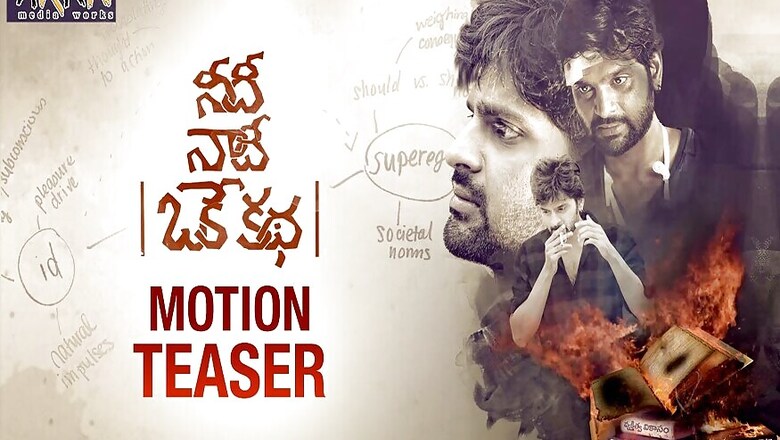
views
Director Venu Udugula has helmed his first film, Needi Naadi Oke Katha, not in the same way that just about everybody makes a movie, but through a technique called Dogme 95. Created in 1995 by two great Danish auteurs, Lars Von Trier (often called the enfant terrible of European cinema and know for his legendary eccentricities) and Thomas Vinterberg (known for a brilliant work on child molestation, The Hunt), Dogme 95 was a manifesto or “vow of chastity”.
Tired of cinema's flirtation with the superficial, the artifice and the garish greasepaint, Von Trier and Vinterberg decided to take the medium back to its roots, its original simplicity. This meant no props, no artificial lighting, no makeup, no special effects and no elaborate use of technology. The story was to be simple, the narrative style simpler. Later, two more Danish directors, Kristian Levring and Soren Kragh-Jacobsen, joined the movement.
It was Vinterberg who first had a shot at Dogme 95 with his Festen or 'The Celebration' – which premiered at Cannes in 1998. A devastating look at how skeletons are pulled out of the dark recess of a cupboard during a family gathering to celebrate the father's 60th birthday, Festen soon slips into a slanging match with the son accusing the old man of sexually abusing him and his sister (who had recently killed herself). Well, a la Woody Allen or as is being alleged.
Von Trier also made a Dogme 95 film, Idioterne or 'The Idiots' in 1998 that spoke about some men and women who enter a commune to free themselves of their inhibitions. It was widely rumored then that Von Trier had his actors perform actual sex. But nobody knows for sure what exactly transpired on the set. But given Von Trier's mercurial behavior and scandalously unorthodox methods, simulated sex may have been given the go by.
It is this Dogme 95 that Udugula followed while holding the megaphone for his first feature. He told the media the other day that two Danish helmers “came up with 10 points as a manifesto, which were to be kept in mind while making a film. Those days, movie-making was expensive, hence the alternative was to break the stereotypes in mainstream filmmaking. We made this in that structure, and followed seven out of the 10 points. One major rule was to avoid cranes and trolleys. There shouldn’t be graphics, and if a scene has to be shot in a hotel, we need to go to a hotel, not create a set. A lot of new-age movies have been made in Europe and I have been studying that filmmaking process and thought we should do it. My producer was apprehensive initially, and I shot a scene and showed it to him. It came out very well and he was convinced.”
Needi Naadi Oke Katha is the second Dogme 95 work to be made in India. The first was Karma Cartel made in Malayalam.
Needi Naadi Oke Katha - a Telugu language film - deals with a father-and-son relationship. “Needi Naadi Oke Katha is what the heroine tells the hero. The audience will identify with the characters and the movie can be termed a social satire... Society creates a set of values and expects individuals to have long-term and short-term goals, which is a misconception Why should one have a goal? Parents shouldn’t pressurize children by telling them that they have to become doctors and engineers. The hero here cannot adjust to these set rules and expectations. The conflict is between values defined by society and his mindset.” The plot unfolds in Chittoor and Sree Vishnu plays the male lead.
While the movie's storyline is nothing novel (we see this most graphically in Three Idiots), Udugula seems to have forgotten that the Dogme 95 experiment failed in Europe, and even its first creators, Von Trier and Vinterberg, gave up making cinema this way just after they had made a couple of films.
The “vow of chastity” did not last for several reasons. One, many saw Dogme 95 as some sort of plaything in the hands of two Danes. It was a kind of personal wish fulfillment or personal aggrandizement. So, hardly anybody took this seriously. Two, as The Guardian wrote in 1998 on the release of Festen in the UK: “This is the story of how the failure of the French New Wave led to director Thomas Vinterberg starring as Young Taxi Driver in his own movie, Festen. Of how an anti-bourgeois movement can be spearheaded by film-makers who take tea with the Queen. Of how 'a great laugh between four Danes generated three of Europe's most interesting films this year”. The Idiots and The Celebration were two. But then the laugh wore off, and Dogme 95 stammered and stuttered before vanishing.
So to me, it appears like a repeat of history when I see Udugula's attempt to follow Dogme 95. India has been a favourite dumping ground for rejects from the rest of the world. Most made-in-China stuff that finds its way into Indian markets is so inferior that it will not find any taker elsewhere. Remember those days when medicines past their expiry were sold in India? Probably, they still are. And so many drugs that had outlived their utility in the West or were found to be harmful continued to merrily prescribed and used in India. Perhaps this continues.
One suspects that Udugula must have found no proper financier for his work, and so he probably settled for a rather inexpensive method like Dogme 95 – tried in Europe and given up, because modern cinema could just not be made the way Von Trier and his ilk once thought it could. Most importantly, Dogme 95 was first tried out to break out of the formulaic. But has Udugula broken out of this rut? We shall soon see, when the picture opens in mid-February.
(Gautaman Bhaskaran is an author, commentator and movie critic)



















Comments
0 comment